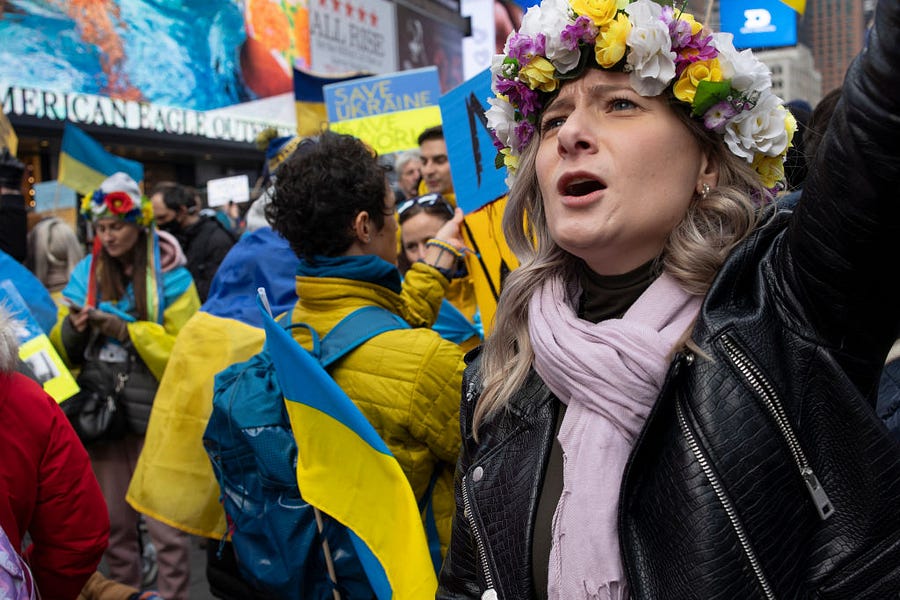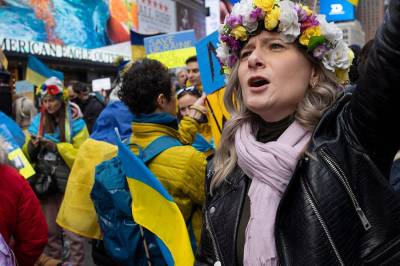Hours after Ukrainian President Volodymyr Zelensky urged U.S. lawmakers Wednesday morning to institute a no-fly zone over Ukraine and send more weapons to stave off Russian attacks, a small crowd of rabbis, Jewish-Americans, and Ukrainian-Americans gathered in front of the Russian embassy in Washington, D.C., to protest the war.
Rabbi Gilah Langner from Arlington, Virginia, approached the mic Wednesday afternoon and spoke of the Fast of Esther, a three-day fast that began Wednesday that celebrates the Jewish people’s liberation from genocide as told in the Book of Esther. “Esther called for it at a time of great personal and communal peril in response to the genocidal plans of a power-hungry, arrogant, and evil official named Haman,” she told the crowd as one rally attendee passed around a poster for others to write down their names alongside their ancestral hometowns in Ukraine.
“Today we face a modern day Haman,” Langner said in a reference to Russian President Vladimir Putin, whose soldiers have been killing Ukrainian civilians with impunity since the war broke out late last month.
The country’s rising death toll is poignant for Darian Diochok, a U.S. veteran of Ukrainian descent whose 52-year-old nephew is serving in the Ukrainian military after two initial failed attempts to volunteer. “The third time they said, ‘We need all the help we can get,’ and they gave him a battalion to command,” Diochok said in an interview.
Wednesday’s rally was a microcosm of the many Ukrainian-Americans who are watching the war break out from afar as they reflect on their country’s embattled history both before and after 1991, when the country declared independence from the Soviet Union. Just eight years ago Putin annexed Crimea and Russian-backed separatists invaded the Donbas region of Ukraine.
Memories of 2014 still haunt the Ukrainian Americans who watched from thousands of miles away as large swathes of their homeland fell under Putin’s control. Andrij Dobrianksy, a Ukrainian American born and raised in New York City, said in an interview last week that he recalls watching elderly women in his neighborhood spend entire nights in 2014 with their eyes glued to a livestream of Kyiv, Ukraine’s capital city.
“That’s similar to what’s happening now—people can’t sleep either because of the images in their head, or they’re literally staying up all night trying to communicate with Ukraine or watching the news from Ukraine and seeing how horrible it is,” said Dobrianksy, who serves as the director of communications for the Ukrainian Congress Committee of America, a nonprofit that represents Ukrainian Americans’ interests.
Dobriansky’s mother’s family immigrated to the U.S. from a small village near Ternopil after the war, and his late father left Lviv, Ukraine, after surviving a bombing attack during the Nazi and Soviet invasion in 1939.
Most of the people Dobriansky regularly speaks to on the ground are Ukrainian-Americans who moved to their ancestral homeland after the country declared independence.
Some of those friends are now subject to Zelensky’s executive order that prohibits all adult males ages 18 to 60 from leaving the country. “I know people who’ve been conscripted. I don’t know where they are,” Dobrianksy said. “I haven’t communicated since that point, and it’s not really something I can dwell on too much without trying to lose it.”
In the meantime, he serves as the choir director at his local church, where he regularly fields questions from panicked church members who have close relatives in Ukraine. “People come up to me and say: ‘I have a daughter there. She doesn’t have residency. She used to have a visa. What do I do? Do I scan my own passport and give it to her?’” he said. “I do feel better when I’m able to share information with people, and at the end of a phone call, they’re not sobbing hysterically.”
Uncertainty surrounding fates of loved ones in Ukraine is also a distressing reality for parishioners at the Ukrainian Catholic National Shrine of the Holy Family in Washington, D.C. “One of our families actually has an older son who has gone back to Ukraine to defend Ukraine,” said Father Robert Hitchens, a priest whose family immigrated from Ternopil to the U.S. in 1913. “They don’t know if their son’s going to make it back.”
War looms over every church service as parishioners receive real-time updates when their loved ones shelter underground to take cover from Russian attacks. Hitchens spoke of the emotional turmoil churchgoers experienced on February 26, the first Sunday after the war broke out. A soon-to-be-baptized child’s godmother was unable to leave Ukraine to attend the ceremony in person, so she participated via video call from a bomb shelter hours after sirens had warned her to take cover.
Watching apartment buildings, churches, and churches bombed to rubble sometimes makes hope difficult to come by.
That feeling is all too familiar to Christina Vosbikian, a half-Ukrainian half-Armenian American whose maternal grandparents immigrated to the U.S. from Ukraine during World War II as refugees. She grew up learning Ukrainian as her first language in the suburbs of Philadelphia, and said in an interview last week that it’s been “impossible to focus on anything else” since the war broke out.
“One of my really good friends, her family is from Kharkiv, which is one of the most attacked cities right now,” Vosbikian said. “It’s just getting completely decimated and she grew up there.” Kharkiv, Ukraine’s second-largest city, is about 20 miles from the Russian border and has been a target of constant shelling since the war broke out.
Those attacks have landed some Ukrainians in mass graves, particularly in Mariupol, a city of roughly 430,000 where Russians notoriously bombed both a maternity ward and a theater sheltering civilians within the past week. According to the Associated Press, the bodies of men, women, and children are reportedly piling up in a ditch in Mariupol roughly 25 meters long. Photos show that mortuary workers wrap civilians and soldiers in cloth or plastic bags—not caskets—before throwing them atop one another in the ditch.
Rally attendee Yaromyr Oryshkevych—another U.S. military veteran who was born in Zolochiv, Ukraine—lamented this grim reality in an interview with The Dispatch outside the Russian embassy on Wednesday. “When you see a double wide ditch and they’re laying the bodies in down there as far as the eye can see, I want to cry.”







Please note that we at The Dispatch hold ourselves, our work, and our commenters to a higher standard than other places on the internet. We welcome comments that foster genuine debate or discussion—including comments critical of us or our work—but responses that include ad hominem attacks on fellow Dispatch members or are intended to stoke fear and anger may be moderated.
With your membership, you only have the ability to comment on The Morning Dispatch articles. Consider upgrading to join the conversation everywhere.